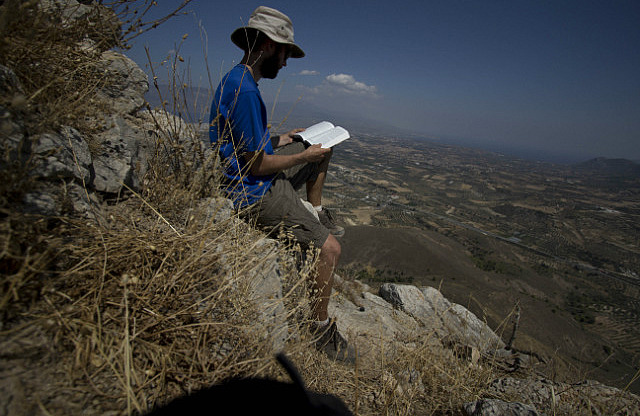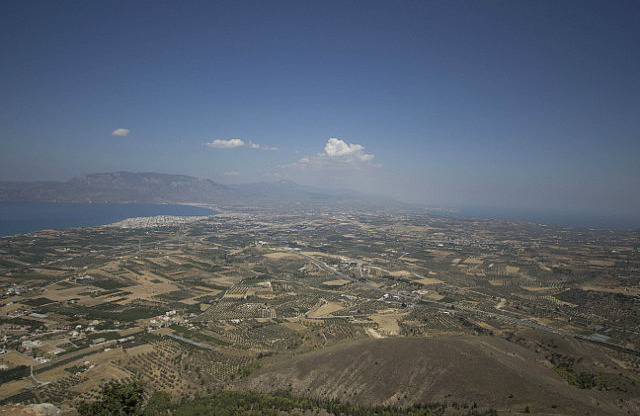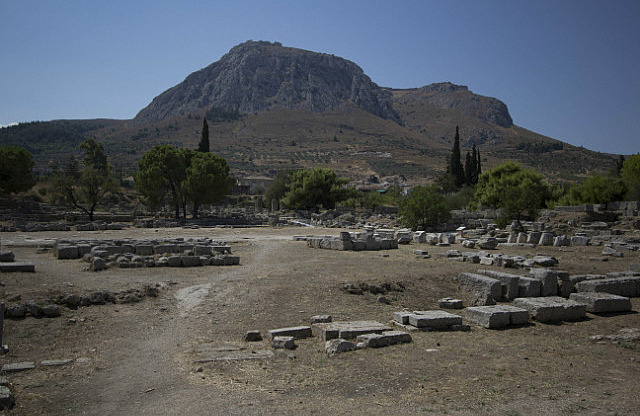IS IT ALL VANITY???...
I was reading and studying the book of Ecclesiastes recently and I thought I would share some things the Lord was showing me in the text and enlightening my understanding. I am not claiming to have done an in-depth study of the book at this time. I simply really enjoyed understanding some of the perspectives and conclusions that the author of the book presents and the gradual shift in his outlook on life as he sought to understand the meaning of our existence in this world.
The theme of the writer of Ecclesiastes (likely Solomon) seems to be that life is all meaningless, at least that is the initial premise he concludes from all his observations. He states this over and over after considering several events and patterns that he sees in the world but finds no purpose in them, it is all like trying to catch the wind (cf. 1:2, 12, 17; 2:11, 17, 23; 4:6,16; 5:16; 6:9). The secrets of the world are perplexing to him and he cannot find them out no matter how hard he tries. He is in despair because he finds no answers and he does not understand the meaning of everything. What does it mean for nothing to change in the world (1:4-11), what good is wisdom if it just causes you to worry and think more (1:12-18), what good are material possessions if they don't really make you happy (2:1-11), what does it matter whether one is wise or foolish if life ends the same for both (2:12-17), what does it mean for a person to work hard but be consumed by worries and restless thoughts and then have someone else get everything the person worked for when he dies (2:18-23). These seemingly insoluble complexities in life have left the author wondering what it all means. Where is the silver lining if there is no real purpose to it all? What else is there if it is all vanity?
However, little by little the author begins introducing the idea that life and things in this world have meaning if one understands them properly as gifts from God. What is good is to eat and drink and work until one is content. Eating, and drinking, and working are meaningless in and of themselves, but they can be meaningful when understood as part of a grander plan and as divine beneficence. We can enjoy life and whatever it may hold knowing that our enjoyment does not consist of what our lives amount to on paper (e.g., what we own, or how smart we are, or how we look or dress, or what we do, family heritage, nationality/ethnicity, etc.) but in the ability to simply enjoy life as a gift we have been given and to meditate upon that fact rather than the seemingly meaningless existence we have on this earth.
Ecclesiastes 2:24-26
So this is the best thing for anyone to do. You should eat all that you need. You should drink as much as you need. You should work hard until it satisfies you. That is how to enjoy your life. I believe that these things come from God. So nobody can eat or enjoy his life without God’s help. God gives the power to be wise. He makes people able to understand things. He wants people to enjoy their lives. He gives these gifts to those people who please him. But people who do not consider God must work too. They will earn rewards and then they can store up their possessions. But these things will benefit only the person who pleases God. This is difficult to understand. It is like someone who is chasing the wind.
It was also concluded by the author that enjoying one's present circumstances in life is important because whether they are good or bad, life is a gift from God and we do not know what may happen in the future. Our life circumstances can change at a moment's notice. We may be enjoying a time a peace now but maybe turmoil later. We may enjoy our work today but next week dislike what we have to do.
The basic idea that the author posits is that humans, just like animals, live and die and the bodies of them both return to the earth from whence they came: we both are born, we live, and we die. To the by-standing spectator that seems to be the case in the world and it is hard to understand then what is the advantage of being human. It is a miserable existence if there is nothing more but to eat, sleep, and grow old. It is a sad thought to think that we just let the world turn until we turn to dust again. If that is what the author sees, he finds the best thing is to then enjoy the life you have. Whatever you do, enjoy that work and be content with your gift from God. While we are alive we can enjoy what we have been given.
Ecclesiastes 3:22
So I realized what is the best thing for a person. He must enjoy his work, because to enjoy his life is God’s gift. Nobody can know what will happen in the future.
People suffer and people die, some people work hard in order to get ahead of others, and some are fools and refuse to work altogether (4:1-8). The author also addresses the proper respect one must have for God, the reverent attitude and behavior when speaking to him, and the intention of making good on a promise when you promise something unless you let your words offend God and you be found to be a liar (5:1-7). He further converses on the abuse of power and authority (5:8-9), and then on the futility of money because money cannot satisfy and people can lose it all and have nothing to show for their hard work (5:10-17). Such a thing is not fair and is a painful tragedy but the reality is that every person comes into the world with nothing and they will also leave with nothing. Therefore, striving after money has no lasting benefit and it only produces endless thoughts and worries about it.
Amidst all these observations that the author has taken note of in the world, he comes to the point where he proclaims what he has found to be good and, in a sense, meaningful in this world.
Ecclesiastes 5:18-20
Then I realized what is proper [good] for people. It is right for them to eat and to drink. It is good for them to enjoy all their hard work. This is what they should do during their short life on the earth. This is God’s gift to people. God has given wealth and possessions to some people. He has given power to those people so that they can enjoy those things. God helps all people to enjoy their lives. He helps them to enjoy their work. All these things are God’s gifts. God keeps us busy and he keeps us happy. Then we shall not have much time to be anxious. We can enjoy what we have.
The critical understanding of the author is that God has blessed some people with financial success and others not so much, and to those who have received wealth he gives them the ability to enjoy such blessings. But, the great secret that the author has discovered is that “God helps all people to enjoy their lives.” It is not one's success, or one's reputation, or one's comfortability, or one's cleverness that they can enjoy, it is LIFE: living, breathing, and moving. Being alive is something to be celebrated in itself.
God provides the ability to enjoy eating, and drinking, and working, and all the details that consume a person's day. This ability is God's gift and he helps people enjoy what he has given them. While being assail in his thoughts on the sea of meaningless things in this world, the author puts down an anchor here for his audience to realize what he has come to realize: God is what gives purpose to life and because of him we can find happiness and enjoyment in all that we do. We may not be able to understand everything, as the author has come to conclude as well (8:16-17; cf. 3:11), but that is not the purpose of life. We are not in a state of “need-to-know” in order to be satisfied, we are in a state of “need-to-enjoy.” Everything we seek for in life will prove to have no ultimate value in the end. Value is ascribed to life only when we see ourselves satisfied by the Lord. He produces the purpose in our lives even in good times and bad. God created both: good times to enjoy and bad times to learn and grow (cf. 7:14). We can enjoy what we have because the Lord has given it to us.
Verse 20 can also be translated “They seldom reflect on the days of their life, because God keeps them occupied with gladness of heart” (NRSV). The author's point is that when we appreciate the present gifts in life, whatever they may be, we will not have much opportunity to think about the past in a negative way or dwell on the hard times and miss living in the today. When we see life as a gift from God, he can fill us with a happiness this world cannot provide. The author looked for every way to be satisfied and happy in this world, and the only thing he found was being satisfied and happy in what the Lord gives him every day.
Ecclesiastes 8:15
So I advise everyone to enjoy their life. That is the best thing to do in this world. There is no better way to live. So eat well and drink well. Then you will be happy while you work hard. God has given a certain time on the earth to each of us.
While everything in this world means nothing by itself (everything is but an action or an item that gives no lasting reward and has no inherent purpose), we can find meaning in life by finding our meaning in God. His gift of life and the blessings (whether great or small) is cause for us to enjoy our time in this world. He gives us meaning and apart from him....everything is vanity (12:8)!





